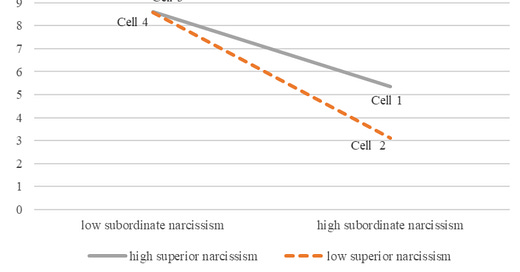Narcissists are terrible people. Personally, I can’t stand them, and I think I am not alone in that. But what happens when you put two narcissists in a room together and let one evaluate the other?
Before we answer that question let us define what narcissism is, or rather what the pathological version of narcissism is. After all, we all are a little bit narcissistic. It is just when it becomes extreme narcissism that we enter the territory of narcissistic personality disorder (NPD):
“The definition of NPD states that it comprises of a persistent manner of grandiosity, a continuous desire for admiration, along with a lack of empathy. It starts by early adulthood and occurs in a range of situations, as signified by the existence of any 5 of the next 9 standards (American Psychiatric Association, 2013):
A grandiose logic of self-importance
A fixation with fantasies of infinite success, control, brilliance, beauty, or idyllic love
A credence that he or she is extraordinary and exceptional and can only be understood by, or should connect with, other extraordinary or important people or institutions
A desire for unwarranted admiration
A sense of entitlement
Interpersonally oppressive behavior
No form of empathy
Resentment of others or a conviction that others are resentful of him or her
A display of egotistical and conceited behaviors or attitudes.”
Extremely narcissistic people may not be the nicest people to be around, but well-adjusted narcissists tend to be successful in the corporate world and apparently tend to climb the corporate ladder faster than less narcissistic people. This means that when it comes to performance evaluations in a company, it happens that a narcissistic boss evaluates a narcissistic employee as well as a non-narcissistic employees. Similarly, a non-narcissistic boss evaluates both narcissistic and non-narcissistic employees. And that makes for some interesting research.
On the one hand, narcissistic employees like to claim successes for themselves and portray themselves in a better way than is warranted by their actual performance. That should give them an advantage of non-narcissistic people in their evaluation because they are definitely not shy about promoting themselves and asking for a big bonus.
On the other hand, aggressive self-promotion goes down poorly with bosses. The case of a narcissistic boss is particularly interesting, because on the one hand narcissistic bosses are less likely to heap praise on their narcissistic employee and thus should evaluate their employees lower than a non-narcissistic boss. Yet, a narcissistic boss will likely feel some form of closeness to a narcissistic employee and we know that bosses subconsciously evaluate employees as better that more closely resemble themselves.
Miriam Maske and Matthias Sohn have used lab experiments with 187 managers recruited from companies in Germany, Austria and Switzerland. They grouped these managers into pairs and let them play a role game where one was playing the boss and the other person the subordinate. They were given a case description and then the “boss” had to evaluate the performance of the “subordinate” in a performance review. Because all participants were managers they were all experienced in conducting performance evaluations both as superior and subordinate.
The results show some good and some bad things, at least in my view.
First, the good news is that narcissistic employees were universally evaluated as worse than non-narcissistic employees. People really don’t like narcissists. Which makes me wonder even more why narcissists apparently make faster careers than non-narcissists despite being evaluated poorly in personal settings.
Second, the bad news is that narcissistic bosses give narcissistic employees the benefit of the doubt. While they evaluate these employees as worse than non-narcissistic employees the drop in smaller than for non-narcissistic bosses. There really seems to be an unconscious bias of managers to promote people that are more like them. And overcoming that bias is what makes performance evaluations so difficult in many circumstances.
Evaluation of subordinates by narcissistic and non-narcissistic bosses
Source: Maske and Sohn (2022)





Again, another great article, thanks for bringing these things to us!
Two thoughts on why narcissists get promoted more easily:
1. Performance evaluations don't matter when it comes to career moves (unless extremely bad)
2. Career moves is a zero-sum game: One person wins, all other candidates lose. That promotes anti-empathetic, competitive behaviours - part of the narcissists skillset.
An answer to your question why nasrcissists relative easily reach the top is given in the book Corruptible, written by Brian Klaas.